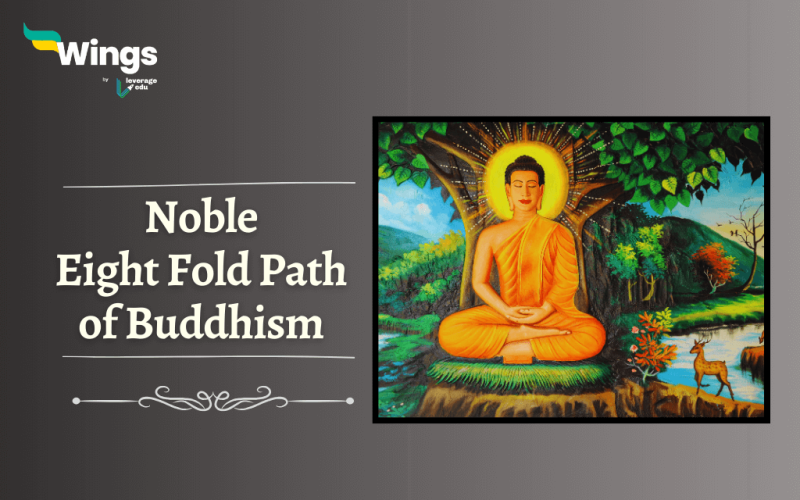Over 2,500 years ago, Buddhism was founded by Siddhartha Gautama (also known as the Buddha). It is a philosophy and way of life that focuses on the alleviation of suffering and the pursuit of enlightenment. The Eight Fold Paths are often referred to as the Noble Eightfold Path of Buddhism and can be considered the practical guideline for individuals who are seeking to attain liberation from suffering and achieve a state of enlightenment. In this blog, we will discuss more information about these paths in an elaborate manner.
Table of Contents
The Eight-Fold Paths of Buddhism UPSC Notes
The central teachings of Buddhism are these eightfold paths of Buddhism. They encompass the various aspects of life and work as a guide for personal growth and spiritual development. Here are the eightfold paths –
List of the Eight Fold Path of Buddhism
| In Pali | In English |
| Samma ditthi | Right Understanding |
| Samma sankappa | Right Intention |
| Samma Vaca | Right Speech |
| Samma Kammanta | Right Action |
| Samma ajiva | Right Livelihood |
| Samma Vayama | Right Effort |
| Samma Sati | Right Mindfulness |
| Samma Samadhi | Right Concentration |
Also Read – What are the Four Noble Truths of Buddhism in English?
The Noble Eight-Fold Paths Explained
Now, let us discuss them in detail –
- Right Understanding
The first path of the Eight Fold Paths is Right Understanding which is called Samma Ditthi.
- This path emphasizes the importance of gaining insight into the true nature of existence, including the impermanence and interconnectedness of all things.
- By developing a deep understanding of the Four Noble Truths an individuals can gain clarity and overcome ignorance.

- Right Intention
The second path can also be called Right Thought or Samma sankappa. It emphasises developing wholesome and positive thoughts.
- It encourages individuals to let go of ill will, harmful intentions, and cravings and instead cultivate thoughts of compassion, loving-kindness, and equanimity.
- By purifying our thoughts, we can create a foundation for a more peaceful and harmonious life. It involves letting go of negative intentions such as greed, hatred, and delusion and instead must have positive intentions for the benefit of ourselves and others.
- Right Speech
Right Speech focuses on the importance of mindful and compassionate communication. In the Pali language, it is called Samma Vaca.
- Words have immense power. Right Speech involves practising truthful, kind, and mindful communication.
- Avoiding gossip, harsh or divisive language and false speech are the hallmarks of this path, promoting harmony and understanding in our relationships.

- Right Action
The fourth path is the Samma Kammanta. It encourages moral behaviour and ethical conduct.
- Right Action focuses on ethical conduct and the importance of engaging in actions that are wholesome, just, and non-harming.
- It encourages individuals to abstain from harming other beings, stealing, engaging in sexual misconduct, and unethical behaviours.
- Right Livelihood
Samma ajiva or the Right Livelihood path promotes a sense of integrity and social responsibility.
- Right Livelihood emphasizes the importance of engaging in honourable and ethical professions that do not cause harm or suffering to oneself or others.
- It encourages individuals to seek livelihoods that promote well-being, and integrity and contribute positively to society.

- Right Effort
The sixth path is Samma Vayama or the Right Effort. It encourages individuals to overcome laziness, procrastination, and negative tendencies, and instead, strive towards personal growth, self-improvement and spiritual development.
- Right Effort involves developing a diligent and persistent attitude towards spiritual practice and personal development.
- It encourages individuals to cultivate wholesome qualities, such as mindfulness, concentration, and loving-kindness, while eliminating negative habits and thoughts.

- Right Mindfulness
This path in Pali is called Samma Vati. By practising mindfulness, we can cultivate a deeper sense of peace, clarity, and insight.
- Right Mindfulness involves developing a heightened awareness and presence in the present moment.
- It encourages individuals to observe their thoughts, feelings, and bodily sensations without judgment, promoting self-awareness, insight, and liberation from attachments.
Also Read – Buddhist Education System: Features, Role & Merits
- Right Concentration
The final path is the Samma Samadhi or Right Concentration. It involves cultivating focused and concentrated states of mind.
- Right Concentration focuses on developing deep concentration and mental stability through practices such as meditation.
- It enables individuals to cultivate a focused and tranquil mind, leading to greater clarity, wisdom, and insight.

The Eightfold Paths of Buddhism provide a clear and practical guide for anyone looking to lead a fulfilling life. By applying these principles in daily routines, you can develop wisdom, compassion, and inner peace. These paths in Buddhism have been practised for years and are encouraged to be adopted by everyone to lead and see spiritual growth.
That is all about the eightfold paths of Buddhism. If you want to read more articles like this, you can get Study notes on the Modern History of India here. Also, you can visit our general knowledge page on Indian History!
 One app for all your study abroad needs
One app for all your study abroad needs













